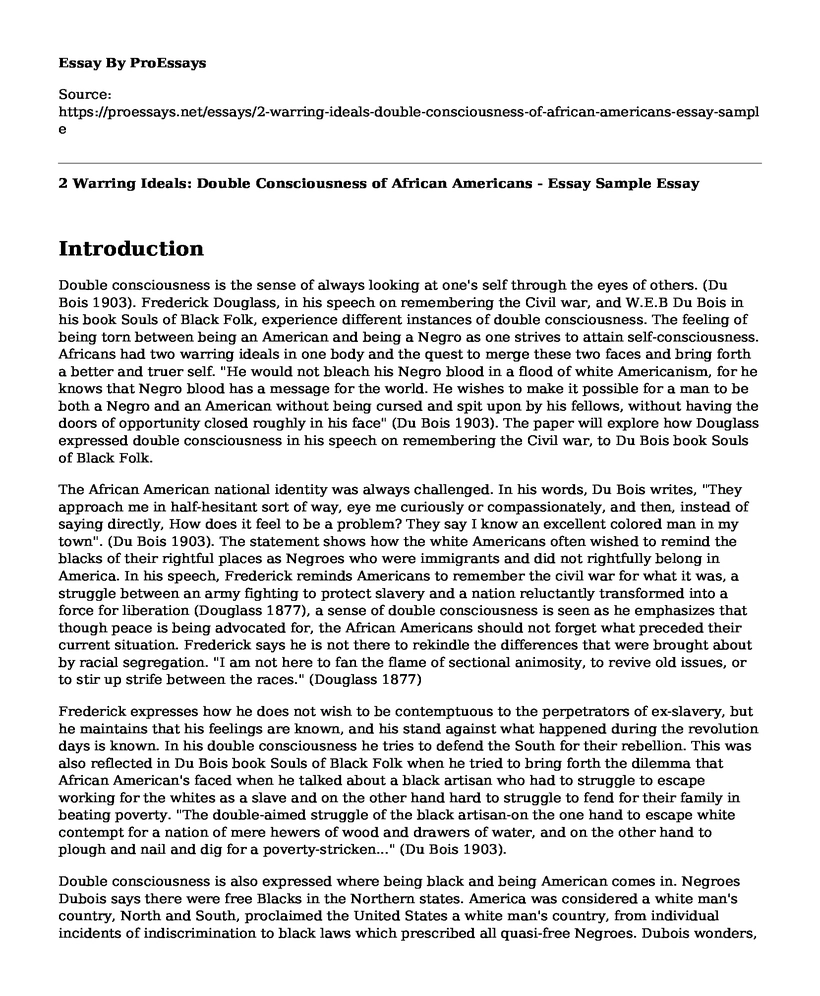Introduction
Double consciousness is the sense of always looking at one's self through the eyes of others. (Du Bois 1903). Frederick Douglass, in his speech on remembering the Civil war, and W.E.B Du Bois in his book Souls of Black Folk, experience different instances of double consciousness. The feeling of being torn between being an American and being a Negro as one strives to attain self-consciousness. Africans had two warring ideals in one body and the quest to merge these two faces and bring forth a better and truer self. "He would not bleach his Negro blood in a flood of white Americanism, for he knows that Negro blood has a message for the world. He wishes to make it possible for a man to be both a Negro and an American without being cursed and spit upon by his fellows, without having the doors of opportunity closed roughly in his face" (Du Bois 1903). The paper will explore how Douglass expressed double consciousness in his speech on remembering the Civil war, to Du Bois book Souls of Black Folk.
The African American national identity was always challenged. In his words, Du Bois writes, "They approach me in half-hesitant sort of way, eye me curiously or compassionately, and then, instead of saying directly, How does it feel to be a problem? They say I know an excellent colored man in my town". (Du Bois 1903). The statement shows how the white Americans often wished to remind the blacks of their rightful places as Negroes who were immigrants and did not rightfully belong in America. In his speech, Frederick reminds Americans to remember the civil war for what it was, a struggle between an army fighting to protect slavery and a nation reluctantly transformed into a force for liberation (Douglass 1877), a sense of double consciousness is seen as he emphasizes that though peace is being advocated for, the African Americans should not forget what preceded their current situation. Frederick says he is not there to rekindle the differences that were brought about by racial segregation. "I am not here to fan the flame of sectional animosity, to revive old issues, or to stir up strife between the races." (Douglass 1877)
Frederick expresses how he does not wish to be contemptuous to the perpetrators of ex-slavery, but he maintains that his feelings are known, and his stand against what happened during the revolution days is known. In his double consciousness he tries to defend the South for their rebellion. This was also reflected in Du Bois book Souls of Black Folk when he tried to bring forth the dilemma that African American's faced when he talked about a black artisan who had to struggle to escape working for the whites as a slave and on the other hand hard to struggle to fend for their family in beating poverty. "The double-aimed struggle of the black artisan-on the one hand to escape white contempt for a nation of mere hewers of wood and drawers of water, and on the other hand to plough and nail and dig for a poverty-stricken..." (Du Bois 1903).
Double consciousness is also expressed where being black and being American comes in. Negroes Dubois says there were free Blacks in the Northern states. America was considered a white man's country, North and South, proclaimed the United States a white man's country, from individual incidents of indiscrimination to black laws which prescribed all quasi-free Negroes. Dubois wonders, "Why did God make me an outcast and a stranger in my own house?" (Du Bois 1903). Frederick says that the emancipated Negroes stay harmoniously with the whites but at the same time states that to have peace, law, liberty, and justice have to come first. Negroes should not be treated any differently. "We tender you on this Memorial Day the homage of the loyal nation, and the heartfelt gratitude of emancipated millions" (Douglass 1877). He says that it is still clear that the American citizens, both whites and Negroes are still distressed by the aftermath of slavery and revolution. Double conscious aspect comes in when the Africans still see themselves as slaves in the eyes of the whites. It is, therefore, their wish that for peace to continue prevailing, they should ensure equality for all. In his book, Du Bois, also illustrated how he thought he was one of the whites-only to be reminded that he was different in the eyes of the other kids. "Then it dawned upon me with certain suddenness that I was different from the others." (Du Bois 1903).
Conclusion
Black Americans' existence in United States faced discrimination. By looking at the Dubois' book and Frederick's speech, we can see how the Negro's experience in racial segregation, fight for liberation, slavery, and the revolution, brought about aspects of double consciousness and how the two relate.
Works Cited
Frederick Douglass on Remembering the Civil War, (1877)
W. E. B. Du Bois, The Souls of Black Folk (1903)
Cite this page
2 Warring Ideals: Double Consciousness of African Americans - Essay Sample. (2023, Feb 27). Retrieved from https://proessays.net/essays/2-warring-ideals-double-consciousness-of-african-americans-essay-sample
If you are the original author of this essay and no longer wish to have it published on the ProEssays website, please click below to request its removal:
- Roles of America in Cold War Asia Essay
- Paper Example on Terrorism
- Beat Generation Questions Paper Example
- Essay Sample on Portrayal of Human Behavior in Hamlet: To Be or Not To Be
- Essay Example on Leslie Silko's Poem: Exploring Nature's Beauty
- Essay Sample on USA Economy: 30 Years of Rapid Growth and Inflation
- Essay Sample on Oedipus: Blindly Making Decisions Through Pride & Fate







